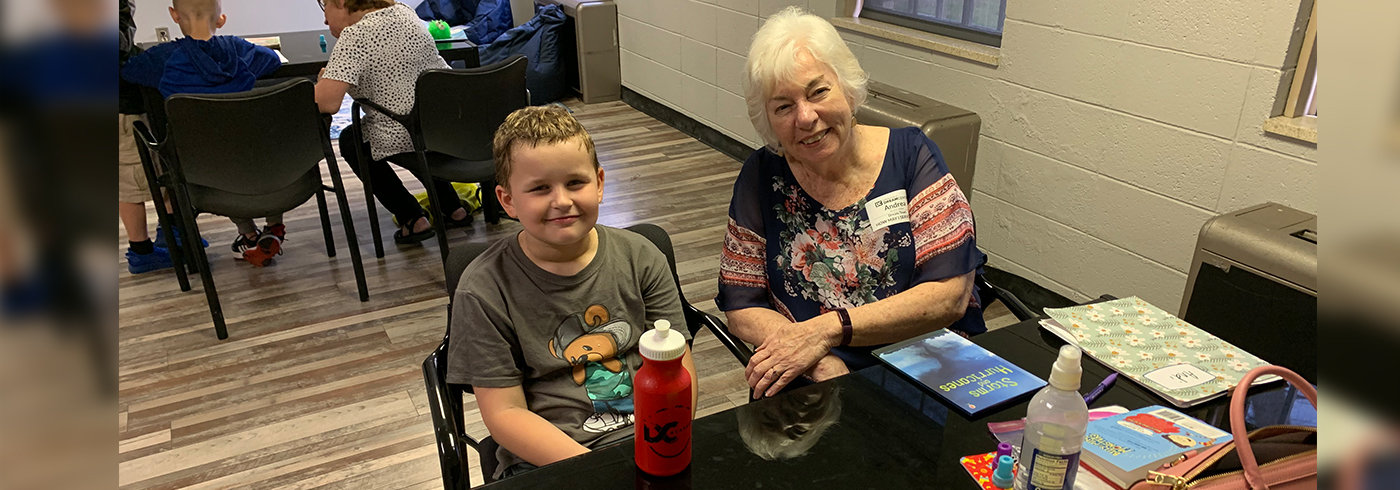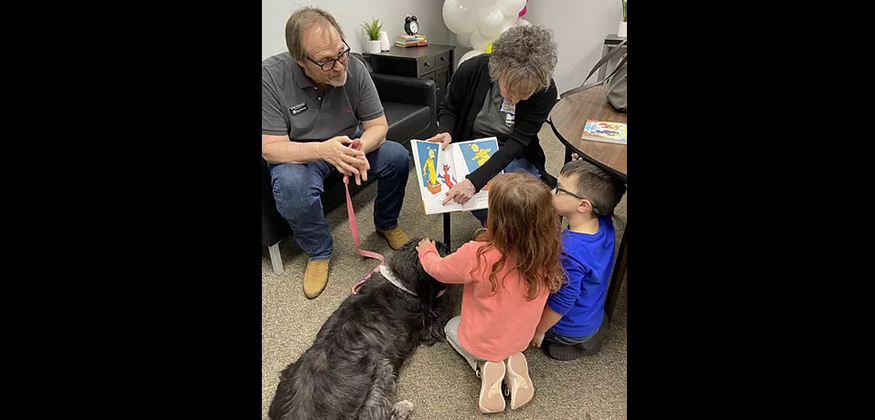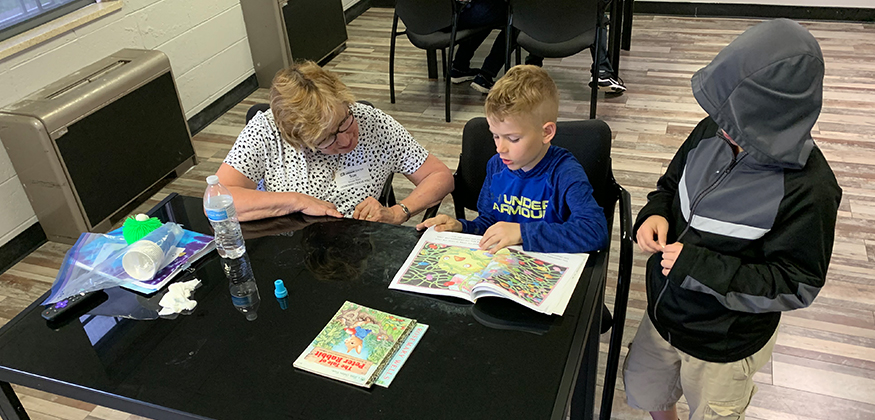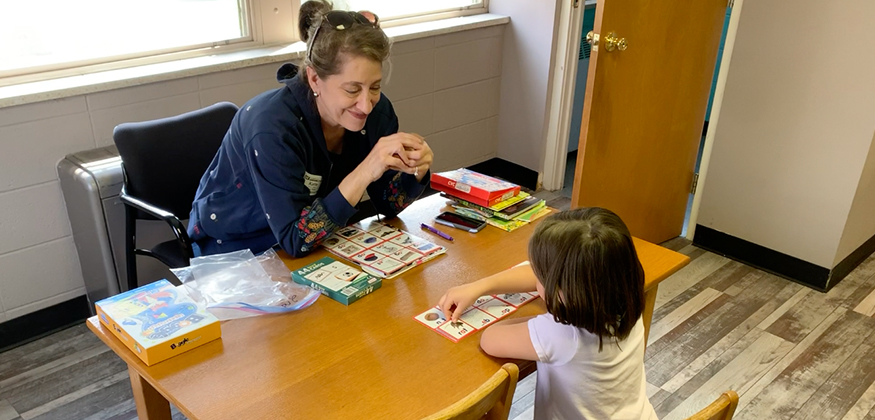Reading Buddies
 The Springfield Dream Center has found that children needing educational assistance respond well to reading with older adults . . . and a furry friend.
The Springfield Dream Center has found that children needing educational assistance respond well to reading with older adults . . . and a furry friend.
The Springfield Dream Center in Missouri operates like many dream centers do — looking to care for and lift up people in their communities who are struggling in a wide variety of ways.
However, Jody Dow, the executive director of the Springfield Dream Center, says one of their center’s most successful efforts has been in helping elementary-age children trailing in their reading skills to “catch up” to their classmates. The program is now called Reading Buddies, but the effort was started by two “grandmas” — Ruth Huelskamp and Janet Clark — whose warmth and love won the children over.
A challenge for many children who struggle to read is that they’re too embarrassed to try to read in front of their classmates who have mastered their age-level reading, so they stop trying or simply refuse to read. So the grandmas simply started coming in to read to the children. Reading with “grandma” became a highlight for the children and soon Grandma Ruth and Grandma Janet began to invite children to actively participate in their reading times.
“We currently have about 35 to 40 students from the nearby elementary school attending our afterschool program,” says Dow, who founded the Dream Center with the help of North Point Church (AG) in 2017. “The school is a Title 1 school, which means a high percentage of the children qualify for free and reduced-price lunches. A lot of times we find they are children of families who experience generational poverty. They are the working poor — working, but not making a livable wage.”
Dow explains that the afterschool program, called DC Academy, offers multiple “disguised learning” opportunities every day that are weighted toward social and emotional learning, covering such issues as communication, empathy, and conflict resolution. Reading with Grandma Ruth and Grandma Janet was integrated into the curriculum with great success.
Since Ruth and Janet started the reading program three years ago, the number of volunteers has expanded to include a total of 12 grandmas, grandpas, uncles, and aunts who read with the children. Over the course of two days, every child has a 20- to 30-minute one-on-one reading time with a buddy where they not only read books, but also play word-based games to help expand their reading abilities.
“I really like playing games with my reading buddy,” says Kilee, a second grader.
“It’s easier to read with my reading buddy,” says Landon, another second grader. “It relaxes me.”
“I have fun reading and I’m a better reader because of it,” says Blaze, who’s also in second grade. “It’s good to learn about things and reading helps your brain get smarter.”
Of course, as incredibly popular as Grandma Ruth and Grandma Janet and all the other reading buddies are, the favorite reading buddy of almost every child is Lucy — a 15-year-old therapy dog.
Katie Struckhoff, a retired elementary school teacher, started volunteering as a reading buddy after Ruth told her about what she was doing at the Dream Center.
“I love doing this because it puts me back in the classroom and gives me a sense of purpose,” Katie says. “God gave me this gift — to teach reading — and I want to use it however I can.”
Of course, it wasn’t long before she began to wonder how the kids would respond to her husband’s (Mark Sponsler) therapy dog, Lucy. She checked with Dow, received permission, and Lucy became the 13th member of the Reading Buddies.
“When kids read by themselves,” observes Ruth, “they’ll take chances that they wouldn’t normally take in front of a classroom. However, they take the most chances with Lucy as there’s absolutely no peer pressure . . . a lot of times they’ll even want to practice their story ahead of time to read to Lucy.”
Ruth also noted that recently two “grandpas” started volunteering as reading buddies. To her, that was another landmark moment. “So many of the kids don’t have any positive male influences in their lives at all,” she says.
As the children interacted with teachers, some acting out a little as a “stranger” was visiting, it was still quite clear that Reading Buddies time was a favorite activity that was also filled with the individual attention they craved.
Sue Walberg, who is a relatively new Reading Buddy, says she has seen marked improvement over the past semester in the kids’ reading abilities. Perhaps most importantly, she’s also seen an improvement in kids’ self-esteem.
“They’re proud of their improvement (in reading),” she says. “And when they have that self-value, that self-esteem, they do everything better because they don’t automatically think that they can’t (do better).”
Some who may be unfamiliar with what daily life is for many of the kids attending the Dream Center, may believe that the kids are being coddled and should just apply themselves more at school — just do their homework instead of “getting into trouble” or being “lazy.”
Environment plays a big role in how many of these kids have learned to approach life prior to attending the DC Academy. One of the Reading Buddies quietly shared how one of her students was excited as this weekend he was going to get to see his dad . . . at the federal prison in Oklahoma. Another boy shared how he couldn’t read to his dog (a pit bull) as a neighbor had reported them and the police came and ended up shooting his dog. Food insecurity, family insecurity, and what one may say is even “life/protection insecurity” that comes with living in a high-crime, high-drug-use area all are part of everyday life for many of the kids.
Dow adds that many of the children are being raised by family members — grandparents, aunts, uncles, older siblings — and sometimes, even if a parent is available to assist with schoolwork, it’s not unusual for that parent to have their own struggles with reading, compounding the challenges.
In addition to providing afterschool care for elementary kids, the center hosts and provides learning opportunities for about 30 middle schoolers from another nearby Title 1 school in the mornings.
Julie Weinreis, DC Academy director, says that a change in the district’s middle school start time to 9:30 a.m. placed many working parents/guardians in a difficult situation, so the center adjusted to meet the needs of the neighborhood.
Yet, as much as the children respond to the Reading Buddies program as well as the teachers who make learning worth “behaving” for during the rest of their hours at the center, what seems to make the center work is that the employees and volunteers experience and celebrate the joys of kids’ successes with them as a family.
“We work on establishing a family culture in the classroom,” says Weinreis. “We have pictures of the kids on the walls, we assign certain ‘special’ classroom jobs, and we work on building connections in the classroom — when kids feel connected, there’s less likelihood of conflict.”
Also, as the family culture is established, kids feel more comfortable interacting with the staff and volunteers — one recently asking a Reading Buddy to come watch his ball game. They also feel more comfortable in bringing up questions, including questions about God.
“We allow Jesus conversations to happen in classrooms as teachers feel is best,” Dow says. “We also offer the church service on the weekend as a ready next step for families.”
Dow says that the DC Academy has become a place where adults can use their gifts, whether it be baking to teach math, gardening to teach science, or training a dog to improve reading, to help kids achieve success in the classroom and in life.
“We love seeing how God uses people’s passions and gifts to help kids,” Dow says. “And I believe that it’s only a matter of time before God draws all of these kids and at least portions of their families into our weekend church service where they can come hear about, respond to, and fully experience the gospel message.”


